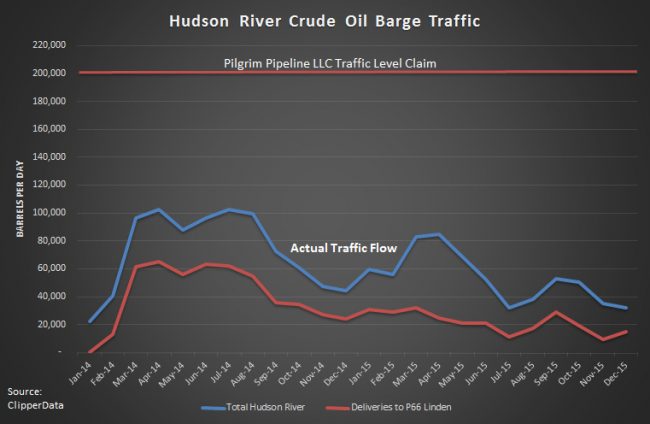Capital Region unanimously opposes the Pilgrim oil pipelines

View more images on our Flickr site
 Capital Region municipalities in the direct path of the proposed Pilgrim oil pipelines now stand in unanimous opposition. In a 5-0 vote (with two abstentions), the Rensselaer Common Council opposed the construction of the proposed pipelines. The City of Rensselaer joins neighboring municipalities Albany, Bethlehem and East Greenbush in memorializing their strong opposition to the construction of this massive fossil fuel project through their communities. They understand that Governor Cuomo’s energy plan demands that we need less fossil fuel infrastructure, not more. The resolution that passed in Rensselaer highlights the risks of Pilgrim and the clean energy future New Yorkers are demanding.
Capital Region municipalities in the direct path of the proposed Pilgrim oil pipelines now stand in unanimous opposition. In a 5-0 vote (with two abstentions), the Rensselaer Common Council opposed the construction of the proposed pipelines. The City of Rensselaer joins neighboring municipalities Albany, Bethlehem and East Greenbush in memorializing their strong opposition to the construction of this massive fossil fuel project through their communities. They understand that Governor Cuomo’s energy plan demands that we need less fossil fuel infrastructure, not more. The resolution that passed in Rensselaer highlights the risks of Pilgrim and the clean energy future New Yorkers are demanding.
Among the many reasons enumerated in Rensselaer’s July 20 resolution (read here), a few excerpts perfectly capture why 27 municipalities in New York have opposed the proposed pipelines.
Rensselaer and other municipalities understand the risks, “…according to PHMSA, pipeline operators reported 1,880 crude oil spills incidents nationwide between 2003 and 2013, or nearly one incident every other day, resulting in over 44,265,438 gallons of oil being spilled; and WHEREAS, 80 percent of these incidents were the result of corrosion, equipment failure, incorrect operation or material and weld failures; and WHEREAS, according to Public Employees for Environmental Responsibility, PHMSA only has 135 inspectors to oversee 2.6 million miles of oil and gas pipelines in the United States, and only a fifth of that pipeline system has been inspected by PHMSA or its state partners since 2006…”
Due to the risk of spills and the absence of enforcement, the resolution notes that, “ the Pilgrim pipelines also threaten important surface water resources, including the Hudson River, which the pipelines are proposed to cross twice, and all of its major tributaries…” The clause highlights the reasons for Riverkeeper and our coalition’s opposition to the proposal.
- Two parallel pipelines are proposed to run from Albany-Rensselaer for 178 miles to Linden, New Jersey.
- One pipeline would carry crude oil south to these refineries, and the other would carry refined petroleum products north, while five laterals would carry oil for 13.5 miles from the mainlines to tank farms along the Hudson River.
- Each mainline would be 20 inches in diameter with 8.4 million gallons per day carrying capacity. The northbound pipeline could be reversed to carry crude in both pipelines.
Pilgrim Pipelines Basics
The vote takes on additional significance in light of the veto powers granted to cities and villages in the path of oil pipelines under the New York State Transportation Corporations Law (read “Pass this law to empower towns on petroleum pipelines”). As a result of the City of Rensselaer’s vote, all four cities (including Newburgh, Kingston and Albany) potentially impacted by the pipelines have formally opposed the project. It also does not bode well for the project that three of the five villages (Woodbury, Tuxedo and Cornwall) with same veto authority under the Transcorp law have opposed the pipelines as well (see a complete list of resolutions).
Potential Impacts to the City of Rensselaer

- Two proposed Hudson River crossings. One at the Port of Albany to the Port of Rensselaer, and a second from East Greenbush to Glenmont.
- Tidal River: any spill would be washed up and down with the tides, along the entire Albany and Rensselaer waterfronts, affecting shore front parks, businesses, and recreational facilities.
- More bomb trains in Albany at Global Partners: at 8.4 million gallons per day capacity for southbound oil transport, the pilgrim pipelines would require 5-6x the number of bomb trains arriving in the Port of Albany during the first half of 2016. Data from the independent, non-partisan service ClipperData compiled by Lorne Stockman of Oil Change International confirms our assertion.
- Blast & Evacuation zones: Rensselaer is in the blast and evacuation zones of bomb trains at the Port of Albany. Increasing the number of trains increases the risks to the city residents from a bomb train explosion. http://explosive-crude-by-rail.org/
- Dirtier Air: Albany/Rensselaer has poor air quality that already adversely impacts human health. Additional bomb trains that would feed the added pipeline capacity could worsen the air and impact vulnerable populations such as the young, elderly and those with breathing issues such as asthma. See Earthjustice’s photo journal, “Watching the Rails: One Community’s Quest for Safety”, of the impacts bomb trains have on residents in Albany’s Ezra Prentice Homes, an environmental justice community adjacent to the proposed starting and ending point for Pilgrim’s pipelines.
Local Opposition and Grassroots Organizers Triumph
For several months Riverkeeper and the Coalition against Pilgrim Pipelines-NY worked closely with local activists such as Joanne Kathleen Farrell to educate and activate City of Rensselaer residents about the dangers of the proposed fossil fuel project. Ferrell, of Rensselaer Community Action, led a heroic effort to galvanize the community against the proposed project, going door to door and to local businesses such as the local solar panel installer, Monolith Solar.

Pipeline opponents clapping after activist, Joanne Kathleen Ferrell gave comment. Courtesy of Iris Bloom/Protecting Our Waters
The efforts of local activists, Riverkeeper and CAPP-NY did not go unnoticed by the City of Rensselaer Common Council. In their resolution they noted the strength of local opposition, “… the residents speaking against the pipeline outnumbered the residents speaking in favor of the pipeline by a measure of 21 to one…”
Now that Rensselaer has spoken, Governor Cuomo and his administration should take a close look at the broad and united opposition to these pipelines. The Governor must assess how the project fits into his own policy as described in the resolution, “…the New York State Energy Plan sets clean energy targets of a 40% reduction in greenhouse gas emissions from 1990 levels, 50% of energy generation from renewable resources, and 600 trillion Btu increase in energy efficiency, all by 2030, an 80% reduction in greenhouse gas emissions by 2050, and also provides a comprehensive roadmap for building a clean, resilient, and affordable energy system for all New Yorkers…”
Ultimately, the resolution argues that the “… construction of the Pilgrim pipelines, which will support and expand markets for fossil fuels, is directly contrary to these regional and statewide clean energy plans and goals… ” There is broad agreement from Rockland to Rensselaer counties that this project, if constructed, would take New York down the wrong path.


